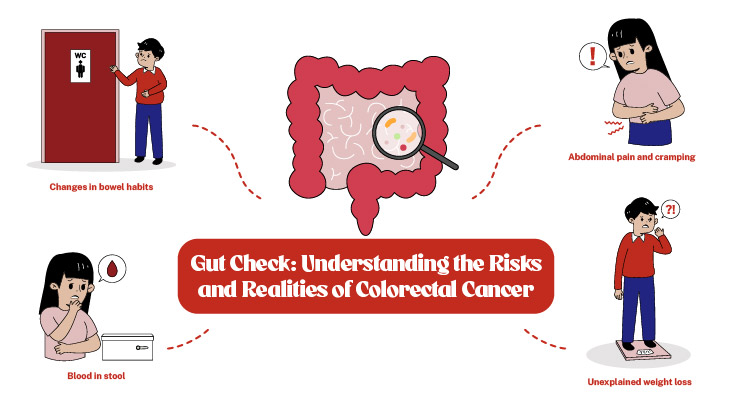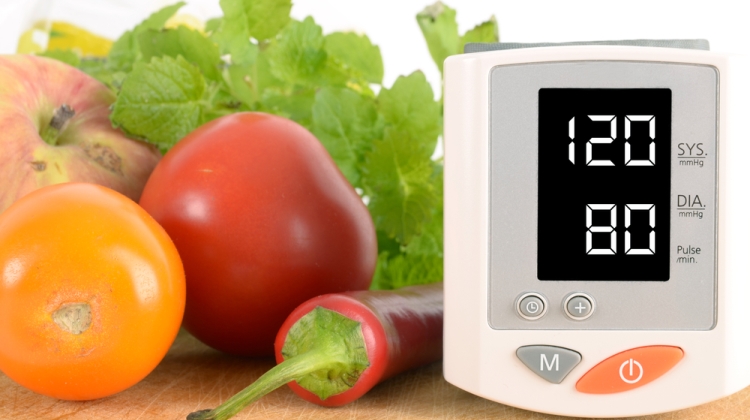Did you know that colorectal cancer, also known as colon cancer, is the most common cancer among Malaysian men, affecting 15 in every 100,000, and is also the third leading cause of cancer deaths in Malaysia?1,2
Furthermore, the World Health Organisation calls colon cancer the "second leading cause of cancer-related deaths worldwide," emphasising its global impact.3,4,5
With March being Colorectal Cancer Awareness Month, we're taking this opportunity to shed light on this disease. We'll explore what colorectal cancer is, how it develops, common risk factors and lifestyle choices to be mindful of, early warning signs to watch out for as well as what current treatment options are available.
Let’s begin with the basics: What is colorectal cancer?
Colorectal cancer, as the name suggests ("colo" for colon and "rectal" for rectum), can actually start in either the colon or the rectum. These two parts of the lower digestive system share many similarities, which is why they're often grouped together when discussing this type of cancer. Colorectal cancer is a condition where abnormal cell growth occurs in the colon or rectum. These abnormal growths, known as polyps, can develop over time and, in some cases, can become cancerous.
What are the risk factors?
There are usually many complex factors involving your generics, lifestyle and environment – but experts largely concur that these 5 are the most common factors:7
1) Your age is above 50
The risk of colorectal cancer steadily climbs after 50, though concerningly, cases are appearing earlier, even before age 50.
2) You have chronic bowel inflammation
Inflammatory bowel diseases (IBD) like Crohn's and ulcerative colitis increase the risk. The persistent inflammation in IBD can trigger abnormal cell growth, potentially leading to tumours.
3) You have a family history of colorectal cancer
Studies have shown that having two first-degree relatives (parents or siblings) with colorectal cancer raises your risk two to three times.12
4) Gender
Research in Malaysia and data from international studies have shown that men are more at risk of developing this cancer than women.13,14
5) Lifestyle Choices
Risk is elevated if:
- Your diet consists of a lot of fatty foods, red meat, processed foods and is low in fibre (fruits and vegetables).
- You smoke or have a heavy alcohol consumption habit.
- You don’t get much exercise.
- You are obese.
Now that I know the risk factors, what signs and symptoms should I be looking out for as part of my early detection efforts?
Early diagnosis plays a critical role in successfully treating colorectal cancer, especially due to its often subtle initial symptoms.1 Unlike many cancers, colorectal cancer might not present obvious signs in its early stages.
However, there are still key signals to be aware of in your daily life:5,6,7,8,9
● Blood in stool:
Bright red, dark red, or blackish stools can be potential indicators.
● Abdominal pain and cramping:
Chronic pain or cramps that don't subside deserve attention.
● Changes in bowel habits:
Feeling full and bloated frequently, paired with regular gas pains, could be a warning sign. Changes in the consistency of stools and stomach issues, such as persistent diarrhoea or constipation should also be taken seriously.
● Unexplained weight loss:
Losing weight unintentionally can be a cause for concern.
What are the available treatment options for colorectal cancer?
First and foremost, we emphasise the significance of early detection, which not only enhances your prognosis but also significantly increases your chances of recovery. Routine screenings, including colonoscopies, can identify pre-cancerous polyps and early-stage cancers, complemented by diagnostic tools like blood tests, biopsies, and imaging tests.
As for treatment options, there are typically four approaches:7,8,9
1) Surgery
Most colorectal cancers can be removed via surgery – be it via a laparoscopic or polypectomy procedure, or open surgery at more advanced stages.
Estimated cost: RM85,00010
2) Radiation therapy
This therapy involves using beams of intense X-ray energy to kill the cancer cells.
Estimated cost: RM25,00010
3) Chemotherapy
Chemotherapy is employed as a standalone treatment or in conjunction with surgery, where it is utilised to shrink the cancer before surgical removal. It is typically administered in the later stages of cancer.
Estimated cost: RM6,000 per cycle, with there being 4 – 8 cycles per treatment course10
4) Immunotherapy
Immunotherapy harnesses substances produced by the body or created in the laboratory to enhance the immune system's ability to combat cancer cells. It is often employed in conjunction with chemotherapy or other cancer treatments.
Estimated cost: RM20,000 per month, though the treatment and doses vary based on individual patient needs10
What can I do to stay healthy?
Now that you know more about colorectal cancer, let’s shift our focus to prevention. What lifestyle adjustments can help us minimise our risk of colorectal cancer?7,11
● Maintain a healthy weight:
Obesity is a risk factor, so focusing on healthy weight management is crucial.
● Nourish your body with a balanced diet:
Prioritise a diet rich in fibre, low in fat, and packed with fruits, vegetables, and whole grains.
● Incorporate regular exercise:
Physical activity plays a key role in overall health and helps reduce colorectal cancer risk.
● Kick the smoking habit:
Smoking significantly increases risk, so quitting remains one of the most impactful things you can do.
● Moderate alcohol consumption:
Excessive alcohol intake is also a risk factor, so moderation is key.
It is vital to take control of your health with the right knowledge and proactive measures to reduce the risks of colorectal cancer. Early detection, through regular check-ups and screenings, is crucial for successful treatment and often translates to less invasive options. Combining this with a healthy lifestyle empowers you to significantly reduce your risk. Treatment costs can quickly add up over time, which is why it is essential to consider exploring comprehensive cancer protection plans. This can ensure you and your loved ones have access to necessary resources and support in times of need.
References
1. https://www.moh.gov.my/moh/resources/Penerbitan/Rujukan/NCD/Kanser/National_Strategic_Plan_for_Colorectal_Cancer_(NSPCRC)_2021-2025.pdf
2. https://www.pantai.com.my/medical-specialties/oncology/colorectal-cancer
3. https://www.who.int/news-room/fact-sheets/detail/colorectal-cancer
4. https://www.google.com/url?sa=t&rct=j&q=&esrc=s&source=web&cd=&ved=2ahUKEwigtIPnmJKEAxWHXGwGHZ_aD4sQFnoECCYQAQ&url=https%3A%2F%2Fwww.ncbi.nlm.nih.gov%2Fbooks%2FNBK470380%2F&usg=AOvVaw0JVzVpnSps9EbXIkYPVnJH&opi=89978449
5. https://my.clevelandclinic.org/health/diseases/14501-colorectal-colon-cancer
6. https://www.mayoclinic.org/diseases-conditions/colon-cancer/symptoms-causes/syc-20353669
7. https://medlineplus.gov/colorectalcancer.html
8. https://www.cancerresearchuk.org/about-cancer/bowel-cancer
9. https://www.cancer.gov/types/colorectal/patient/colon-treatment-pdq
10. https://ringgitplus.com/en/blog/sponsored/cancer-treatment-in-malaysia-how-much-does-it-cost.html
11. https://www.wcrf.org/diet-activity-and-cancer/cancer-types/colorectal-cancer/
12. https://www.cancer.org/cancer/types/colon-rectal-cancer/causes-risks-prevention/risk-factors.html
13. https://www.ncbi.nlm.nih.gov/pmc/articles/PMC10718645/
14. https://www.ncbi.nlm.nih.gov/pmc/articles/PMC6149054/#:~:text=Incidence%20of%20Colorectal%20cancer&text=1).&text=A%20breakdown%20of%20CRC%20incidence,and%2020.4%25%2C%20respectively).
Let our Life Planning Advisor
assist you to
Request a call back
Thank you for your enquiry. Fill in your details below and a Life Planning Advisor will get back to you within 48 hours.
Call times are Monday-Friday between 8.30am and 5.15pm (except Public Holiday).



